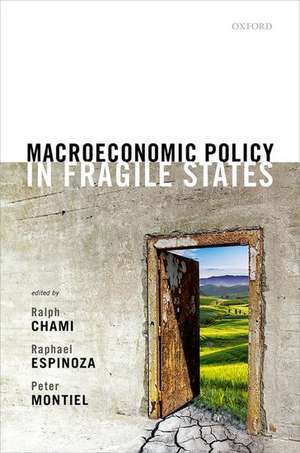Macroeconomic Policy in Fragile States
Editat de Ralph Chami, Raphael Espinoza, Peter J. Montielen Limba Engleză Hardback – 25 ian 2021
Preț: 858.69 lei
Preț vechi: 1225.85 lei
-30% Nou
Puncte Express: 1288
Preț estimativ în valută:
164.31€ • 171.55$ • 135.99£
164.31€ • 171.55$ • 135.99£
Carte disponibilă
Livrare economică 03-10 martie
Livrare express 28 februarie-06 martie pentru 197.96 lei
Preluare comenzi: 021 569.72.76
Specificații
ISBN-13: 9780198853091
ISBN-10: 0198853092
Pagini: 688
Dimensiuni: 164 x 43 x 241 mm
Greutate: 1.18 kg
Editura: OUP OXFORD
Colecția OUP Oxford
Locul publicării:Oxford, United Kingdom
ISBN-10: 0198853092
Pagini: 688
Dimensiuni: 164 x 43 x 241 mm
Greutate: 1.18 kg
Editura: OUP OXFORD
Colecția OUP Oxford
Locul publicării:Oxford, United Kingdom
Notă biografică
Ralph Chami is currently Assistant Director in the Institute for Capacity Development, International Monetary Fund. Most recently, he was Assistant Director and Mission Chief in the Middle East and Central Asia Department (MCD) where he oversaw surveillance and program work on fragile states: Egypt, Libya, Somalia, Sudan, South Sudan, and Yemen. Previously, he was the Chief of the Regional Studies Division in MCD. He is the recipient of the 2014 IMF Operational Excellence Award.Raphael Espinoza is Deputy Division Chief at the IMF, in the Fiscal Affairs Department. He has worked on several crisis cases (Brexit, the euro crisis, IMF SBA programs, etc.) as well as in the IMF Research Department and as Lecturer and Director of the Centre for the Studies of Emerging Economies at UCL. He has written a book on the macroeconomics of the Arab States of the Gulf (OUP, 2013) and papers on international macroeconomics and finance.Peter Montiel is the Farleigh S. Dickinson Jr. '41 Professor of Economics at Williams College. He has also worked at the IMF and at the World Bank, and has served as a consultant for the African Development Bank, the Asian Development Bank, and the Inter-American Development Bank, as well as for several central banks. His research is on macroeconomic issues in developing countries. He has written several books and a number of papers in professional journals.
